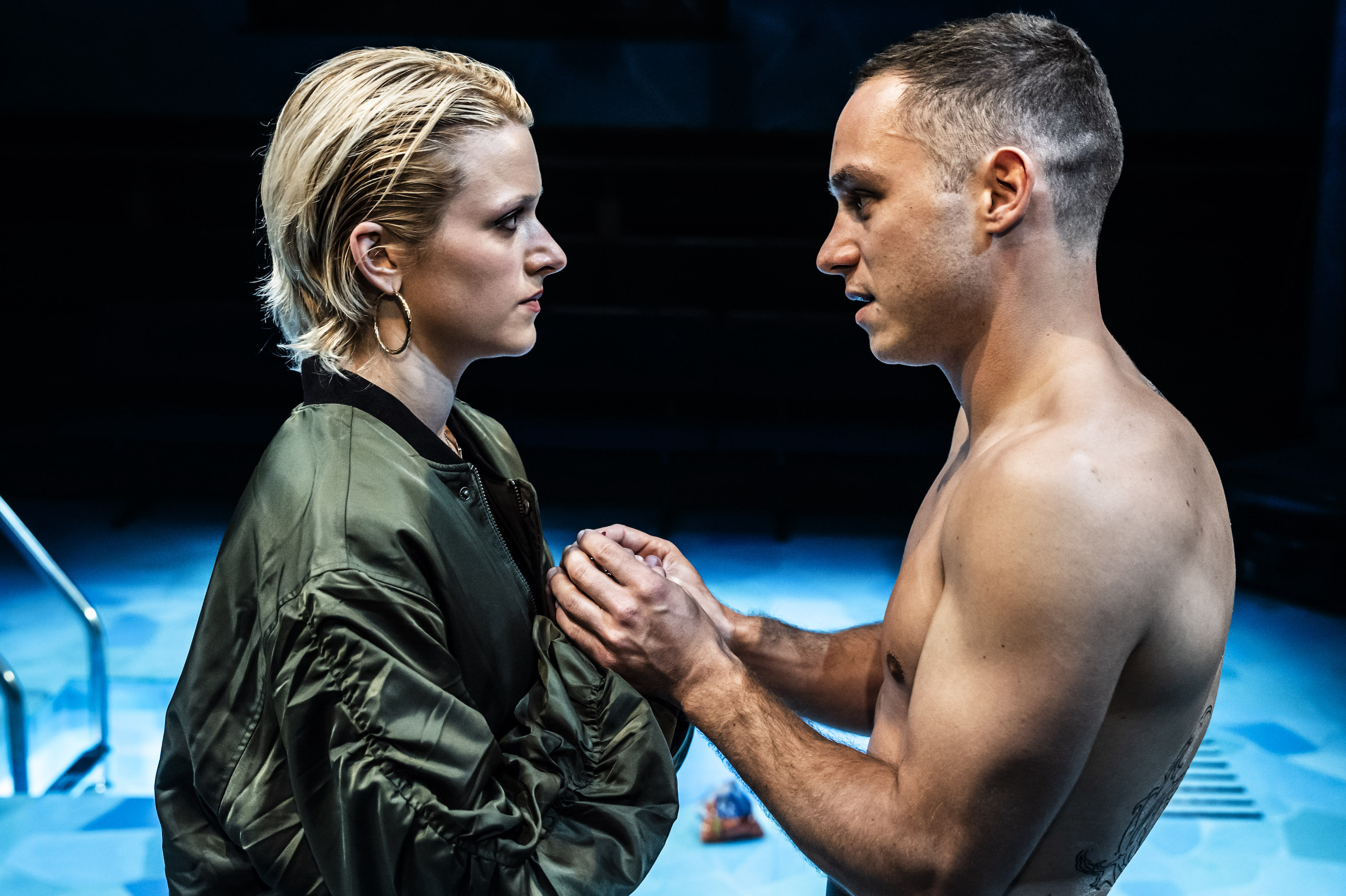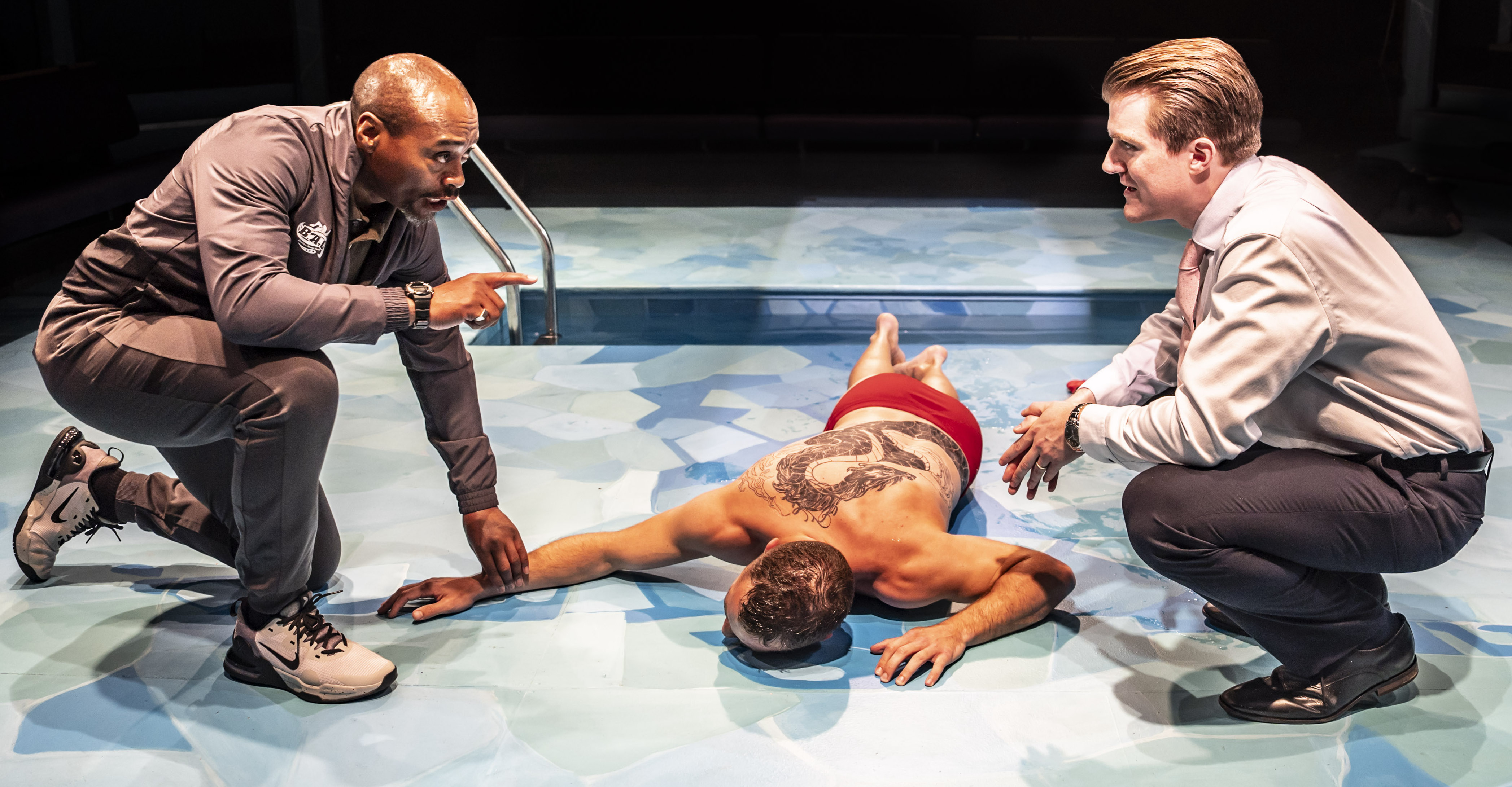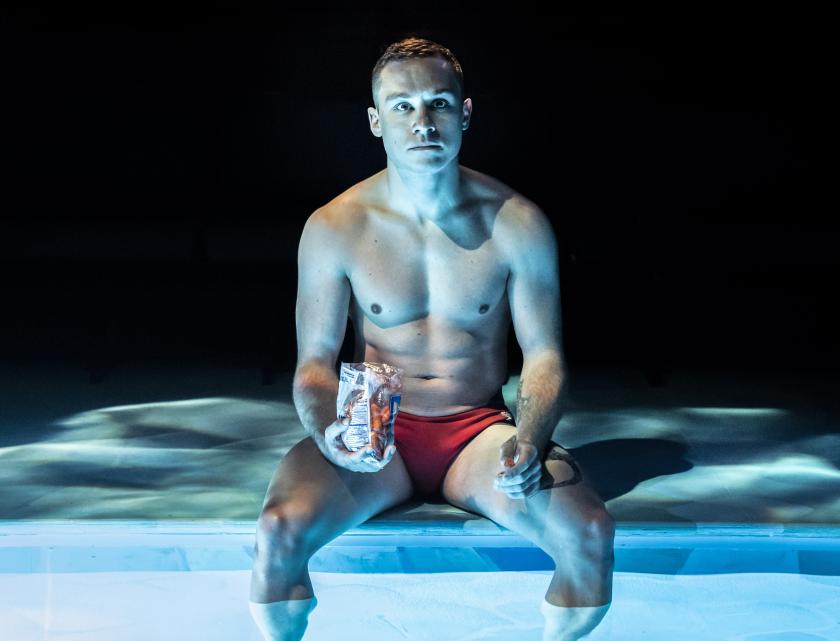Before Lucas Hnath wrote Red Speedo, he had heard a 2004 speech at a hearing investigating baseball doping that declared the practice “un-American”. That started him thinking about the concept of fairness. After the play had been produced in New York In 2016, another politician was boasting that Americans were going to win such a lot, they "might even get tired of winning”.
Red Speedo inhabits the ground between these two positions and is a timely arrival at the Orange Tree, just as athletes prepare for the Olympics, where performance-enhancing drugs may well crop up as an issue. But a bigger contest is looming, when the successor to Joe Biden, that anti-doping speaker in 2004, will pit the Democrats' take on American values against Donald Trump’s, the 2016 speechmaker.
It’s an ambitious staging. There, sunk into the little theatre’s playing space, is a mini-pool full of water, its bright red cover removed once the audience is in place. Anna Fleischle’s design also extends out to the walls of the stalls, which are painted in a Hockneyesque shorthand for blue swimming-pool water. Ray (Finn Cole) will spend a large part of the piece sitting on the side of the pool in a pair of red trunks, sporting a giant tattoo of a snake and nibbling what I took for a popular US brand of cheese snacks but which turned out to be baby carrots.
Sparring with him over what he should do to succeed in swimming is his older brother Peter (Ciaran Owens, pictured bottom with Fraser James and Finn Cole), a lawyer who acts as his agent; and representing the ethics of sportsmanship is his stalwart of a Coach (Fraser James), a committed professional, tough, disciplined and principled. Peter is the opposite of his lunk of a brother, a rangy slick-willy lawyer with a rapid-fire delivery and a mercurial mind. HIs promotional spiel for his brother is so ludicrously overblown, you expect Ray to be able to walk on water, not just set breaststroke records in it.
Peter has come to the pool to head off the trouble that's brewing over the discovery of performance-enhancing drugs at the swimming club. They are assumed to belong to another swimmer, Ted, and Peter is concerned that Ray not be implicated, the club not “tainted”. For him, this means Ted must come forward and confess, not wait for the news to come out when Coach inevitably reports the matter.
 Peter is such a reptilian figure, so intent on winning at all costs, that you know this is smoke-and-mirrors stuff, designed to conceal Ray’s possible involvement in the doping, and ultimately designed to protect Peter. The revelation that Ray has indeed been taking HCG – “made of baby foetuses and stuff”, he says – isn’t long in coming. As is the tortured tale of his relationship with his ex, Lydia (Parker Lapaine, pictured left wth Finn Cole), who brokered his drug deals and lost her sports therapist licence as a result. Meanwhile, Ray is desperate for a loan from Peter to buy more drugs, convinced they are what he needs to win an imminent Olympic qualifying race.
Peter is such a reptilian figure, so intent on winning at all costs, that you know this is smoke-and-mirrors stuff, designed to conceal Ray’s possible involvement in the doping, and ultimately designed to protect Peter. The revelation that Ray has indeed been taking HCG – “made of baby foetuses and stuff”, he says – isn’t long in coming. As is the tortured tale of his relationship with his ex, Lydia (Parker Lapaine, pictured left wth Finn Cole), who brokered his drug deals and lost her sports therapist licence as a result. Meanwhile, Ray is desperate for a loan from Peter to buy more drugs, convinced they are what he needs to win an imminent Olympic qualifying race.
The core of the play’s argument heats up hilariously between the two brothers. Does Ray get a free pass to help himself? He has scoured the anti-doping rules and has interpreted Rule 2 – that drugs can’t be taken if they make competition unfair – in his favour. How can it be unfair, his dull brain argues, for a disadvantaged guy like him to get a boost, a man who before he started doping and rising up the rankings spent his life scraping by and sleeping in his car? It’s like that thing for Black people, he tells Peter, who assures him affirmative action honestly isn’t the same thing. It's money, in Ray's world view, that allows you to be a "real person” with a house and a car and a dog; medals are.just a means to that end. Even so, he resents Peter and his corporate masters for treating him like "a thing".
Money is also crucial for middle-class Peter, though, his means to making sure his daughter doesn’t miss out on a private education and all the advantages that brings. He can't risk financial ruin. To this, Ray counters that if he wins big, Peter does too. Hovering tantalisingly over all their arguments is the possibility of an endorsement contract with Speedo – a major boost for Ray, but also a big win for Peter, who sees a lucrative sports agency in store for him. There is a moment of triumph when Peter arrives with a contract and Ray’s first pair of branded red Speedos.
 The murky depths of which Ray’s drug-taking is the visible sign are only just starting to be plumbed, however. Hnath exposes them bit by bit, carefully rationing out the plot twists, betrayals and revelations, right up to the final pivot in the closing scene. If anything, there are too many twists and turns – they involve Lydia too, embittered and jobless, who dreams of creating a TV series out of her career experiences – and the to-and-fro manoeuvring becomes dizzying, especially when Ray starts shifting position and wanting to clear his conscience. But the energy of the piece is engaging, especially the verbal wrestling of the two brothers in intense bouts of fractured stichomythia, where the dialogue switches from one to the other at breakneck speed, sometimes between syllables.
The murky depths of which Ray’s drug-taking is the visible sign are only just starting to be plumbed, however. Hnath exposes them bit by bit, carefully rationing out the plot twists, betrayals and revelations, right up to the final pivot in the closing scene. If anything, there are too many twists and turns – they involve Lydia too, embittered and jobless, who dreams of creating a TV series out of her career experiences – and the to-and-fro manoeuvring becomes dizzying, especially when Ray starts shifting position and wanting to clear his conscience. But the energy of the piece is engaging, especially the verbal wrestling of the two brothers in intense bouts of fractured stichomythia, where the dialogue switches from one to the other at breakneck speed, sometimes between syllables.
The casting is finely balanced. Cole supplies unwitting punchlines – a corker is the one where he assures Lydia that he has thought about her 15 times a day, “even when I jerk off!” (She quickly deduces this excessive masturbation is a sign of ingesting too much testosterone in the HCG, something he didn’t understand even when he injured his penis.) He is a believable chump, a simple man with few skills except swimming: you recognise his future is bleak out of the pool, though this doesn’t exactly make him a poignant figure. His incomprehension is essentially comic; only his misplaced love for Lydia is sad.
Owens is even funnier, a snake oil salesman with a suit and a law degree whose southern-tinged accent is ideal for delivering snide zingers; he’s also more savage. Only Coach, who sees his profession’s rules as something he is “duty-bound” to follow, is a sympathetic character. James plays him with all the rectitude of an army sergeant, a man contemplating the squandering of all the hard work he has put in to make Ray a champion.
The production zips along under the direction of Matthew Dunster, punctuated with the strident klaxon blasts used to start races at swim meets, signalling a new round in the hostilities between the brothers. It's not a moralistic drama, more a sardonic commentary on the unsportsmanlike conduct of the sports industry; and it packs enough of an intellectual punch to send you home pondering the price of being a winner.
- Red Speedo at the Orange Tree Theatre until 10 August
- More theatre reviews on theartsdesk















Add comment